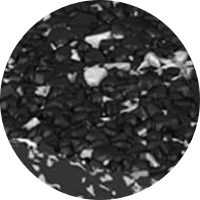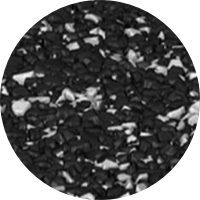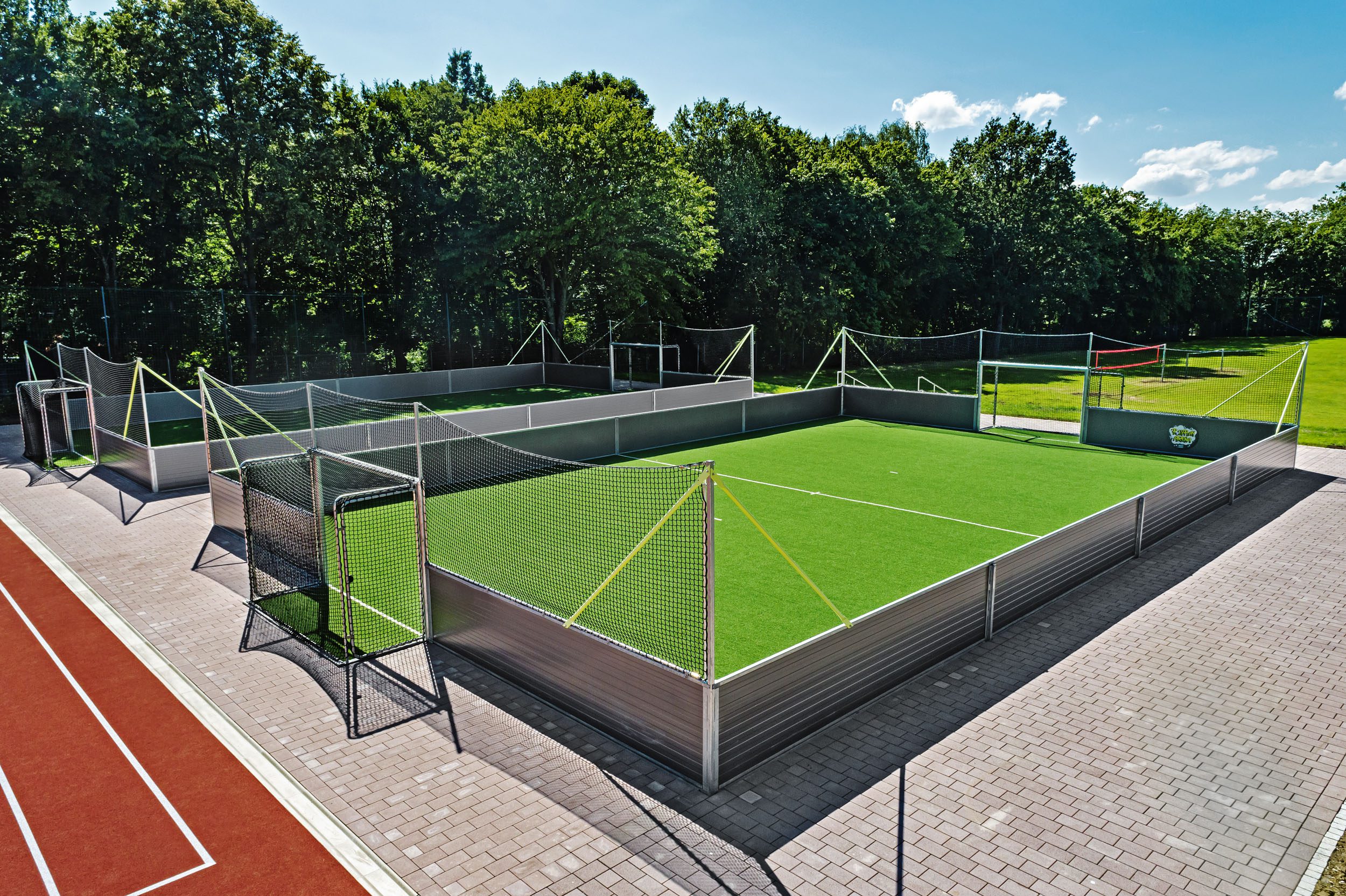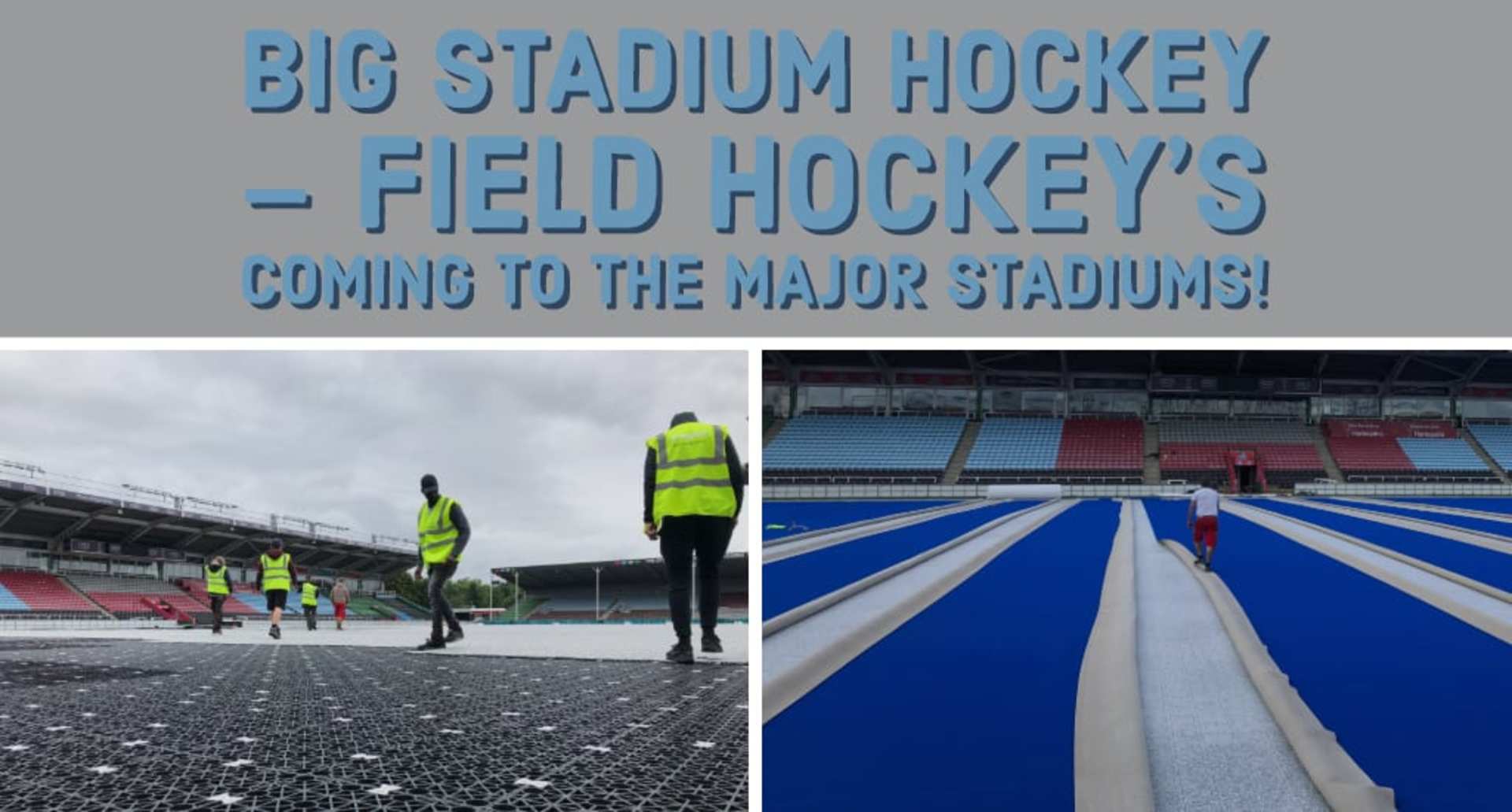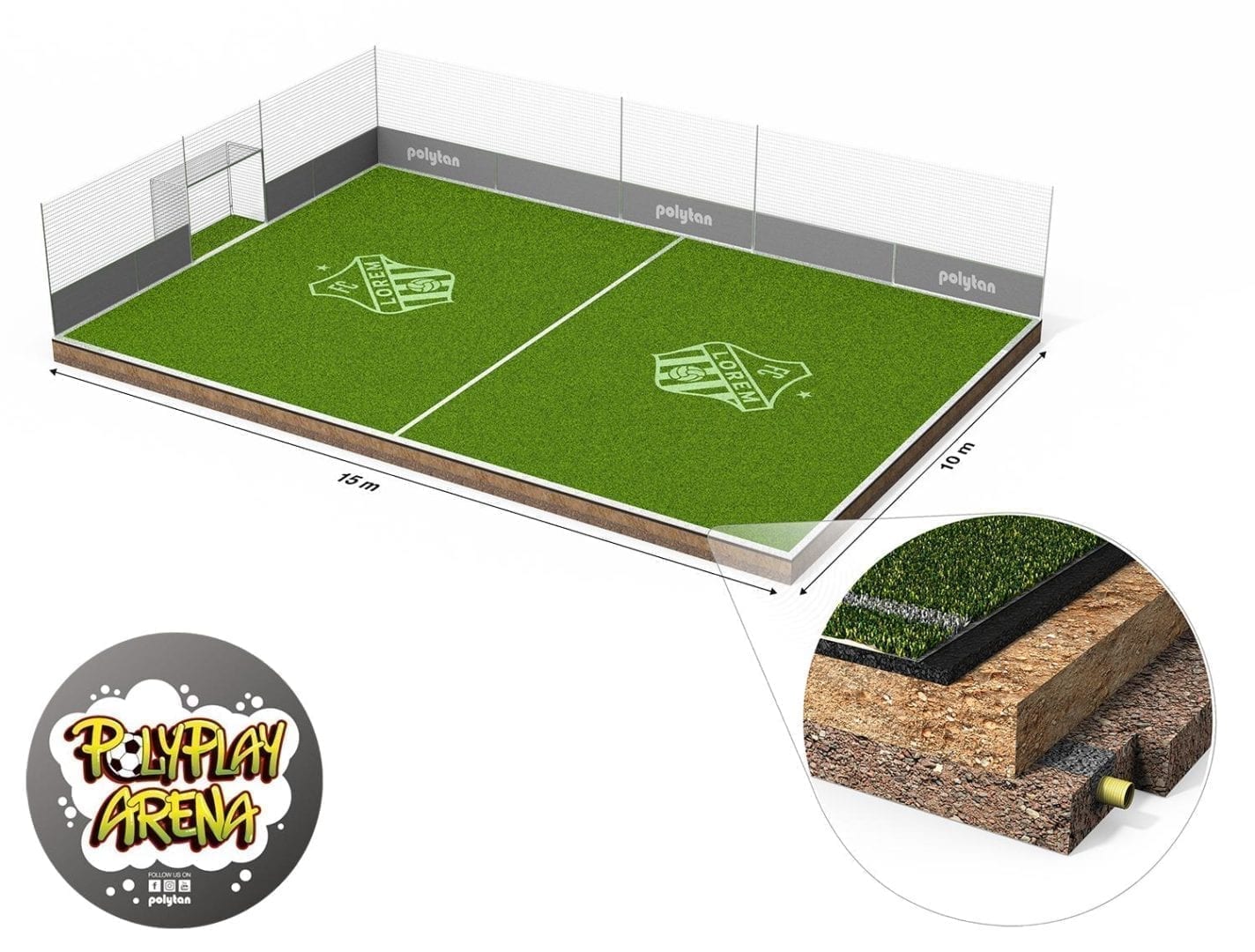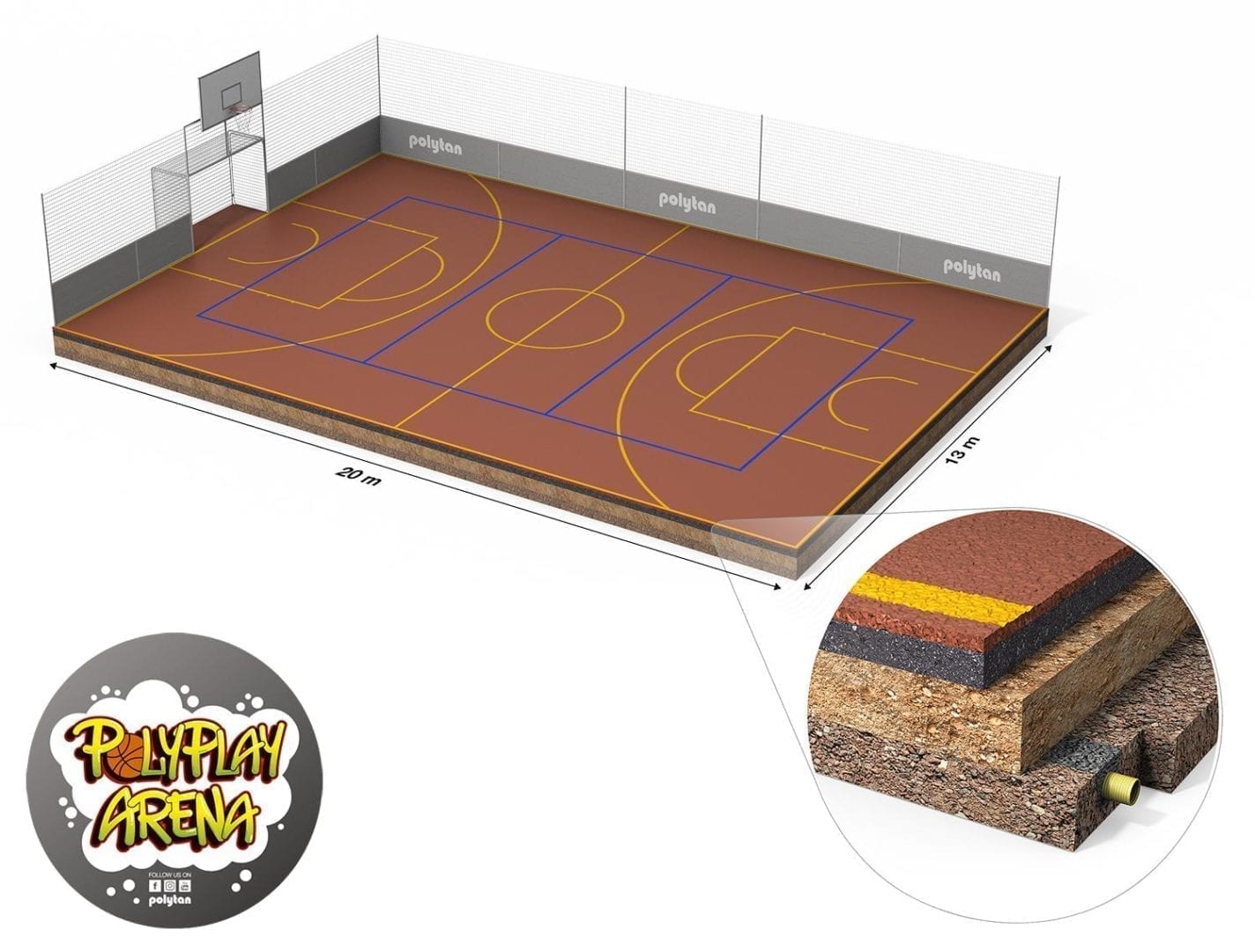Goosebumps in the competition arena – anybody who’s ever been in a stadium and seen their favourite team come back from almost certain defeat has felt them. The more spectators there are filling the stands, the more intense and unforgettable the atmosphere. The largest stadiums in the world hold over 100,000 seats – attendance numbers that field hockey players can only dream of. Nonetheless, recent years have seen the field hockey fan community grow continuously, to the point that available hockey stadiums, which have only a few thousand spectator seats, can no longer meet the needs of major tournaments like the EuroHockey Championships, the Hockey World Cup, or the FIH Pro League. In response, English hockey governing body England Hockey, together with selected partners Polytan, STRI and Polypipe, has launched the Big Stadium Hockey project – an unprecedented concept that makes it possible to transform any stadium in the world into a professional hockey arena – either temporarily or permanently. This is made achievable by the world’s first transportable hockey turf.
Rugbystadion BECOMES FIH PRO League Arena
The demands that the England Hockey governing body placed on the hockey turf for the Big Stadium Hockey project were set high from the start: the playing surface needed not only to be transportable and deployable an unlimited number of times, but also demonstrate an outstanding environmental balance and unsurpassed playing characteristics, thereby making it suitable for professional hockey matches at a world-class level. It also needed to comply with hockey rules. All of these criteria are satisfied by the Poligras Tokyo GT artificial turf system with environmentally friendly Green Technology, which has been developed by Polytan as a partner of the International Hockey Federation (FIH) for the 2020 Summer Olympics in Tokyo. Rapid set-up and dismantling on existing turf within the space of a few days is also decisive.
The first Big Stadium Hockey took place in June 2019 at the Stoop rugby stadium, which is located in the south-western London suburb of Twickenham. The event in question was an FIH Pro League match between the British national men’s hockey team and New Zealand. With 11,500 spectators, it was the largest hockey event since London 2012, when 16,000 fans followed the Olympic hockey matches live at what was then the legendary Riverbank Arena stadium in the Olympic Park. Following the first positive test run at London’s the Stoop, Dublin’s Energia Park rugby stadium was transformed for Big Stadium Hockey on 2 and 3 November. Located in Dublin’s Donnybrook district, the stadium holds 6,500 spectators. The occasion was the FIH qualifying match between the Irish and Canadian national women’s hockey teams for the 2020 Olympic Games.
The first test field for the national hockey team
Prior to deployment at Twickenham’s rugby stadium the Stoop, the hockey turf was first installed as a test field at the headquarters of the England Hockey governing body at Bisham Abbey National Sports Centre – where the British national hockey team are preparing for the 2020 Olympic Games. The feedback provided by Britain’s top players played just as important a role in the development of the portable artificial turf as the laboratory tests carried out by the International Hockey Federation (FIH). The objective was to provide a playing surface that is in no way different from a conventional professional turf. The structure of the Big Stadium Hockey artificial turf is three-layered, and was designed to ensure that the existing natural turf playing fields in host stadiums remain unaffected by its deployment and are ready to play on again as soon as the temporary turf has been dismantled.
The structure of the transportable hockey turf - three-layered and well ventilated and irrigated
The base layer of the three-layer Big Stadium Hockey turf is a synthetic lattice. This lattice is constructed to enable the original soil to continue to be irrigated and ventilated. This is for a maximum period of 6 to 8 days, however, due to the important role played by rapid set-up and dismantling. The base layer holds an elastic layer, onto which the Poligras Tokyo GT BSH hockey turf is unrolled. This first temporary artificial turf in the history of hockey is FIH-certified, making it suitable for official hockey matches.
Sustainable hockey matches with Green technology
Greater utilisation of sports stadiums with additional field hockey events and reutilisation of the three-layer structure makes Big Stadium Hockey an extremely sustainable solution. The concept is improved further still by the good eco-balance of the hockey turf itself. Polytan achieves this through the use of bio-based plastic manufactured from sustainably farmed sugarcane. Around 60 percent of the artificial turf blades presently consist of bio-based I´m greenTM polyethylene, which is manufactured by world market leader Braskem. Furthermore, Poligras Tokyo GT artificial turf requires around 65 percent less water in comparison with older products, making it environmentally favourable even when it comes to the sensitive issue of artificial turf irrigation.
Big Stadium Hockey summarised
With the Big Stadium Hockey project launched in 2019, England Hockey and its partners Polytan, STRI and Polypipe have succeeded in developing a portable hockey turf which is bringing the increasingly popular team sport of field hockey into the major stadiums of the world. This is making it possible for yet more fans to experience the fast-paced and gripping sport live and to revel in the unique atmosphere of large stadiums with capacities of more than 50,000 spectators. It is to fulfil this purpose that the Poligras Tokyo GT BSH artificial turf system has been certified by the International Hockey Federation as an “Approved System Category 2” as part of the “FIH Quality Programme for Hockey Turf”. Further information on the rules of international hockey can be found here. In addition to its outstanding playing properties, the portable hockey turf also saves resources. The artificial turf blades consist of 60 percent renewable, sustainably planted raw material, and the hockey field requires 65 percent less water. No new stadiums need to be built for major sporting events, and the system can be deployed an unlimited number of times. We look forward to many exciting BIG STADIUM HOCKEY matches to come, and will be keeping our fingers crossed for every national hockey team as they prepare for upcoming competitions on the international stage.




